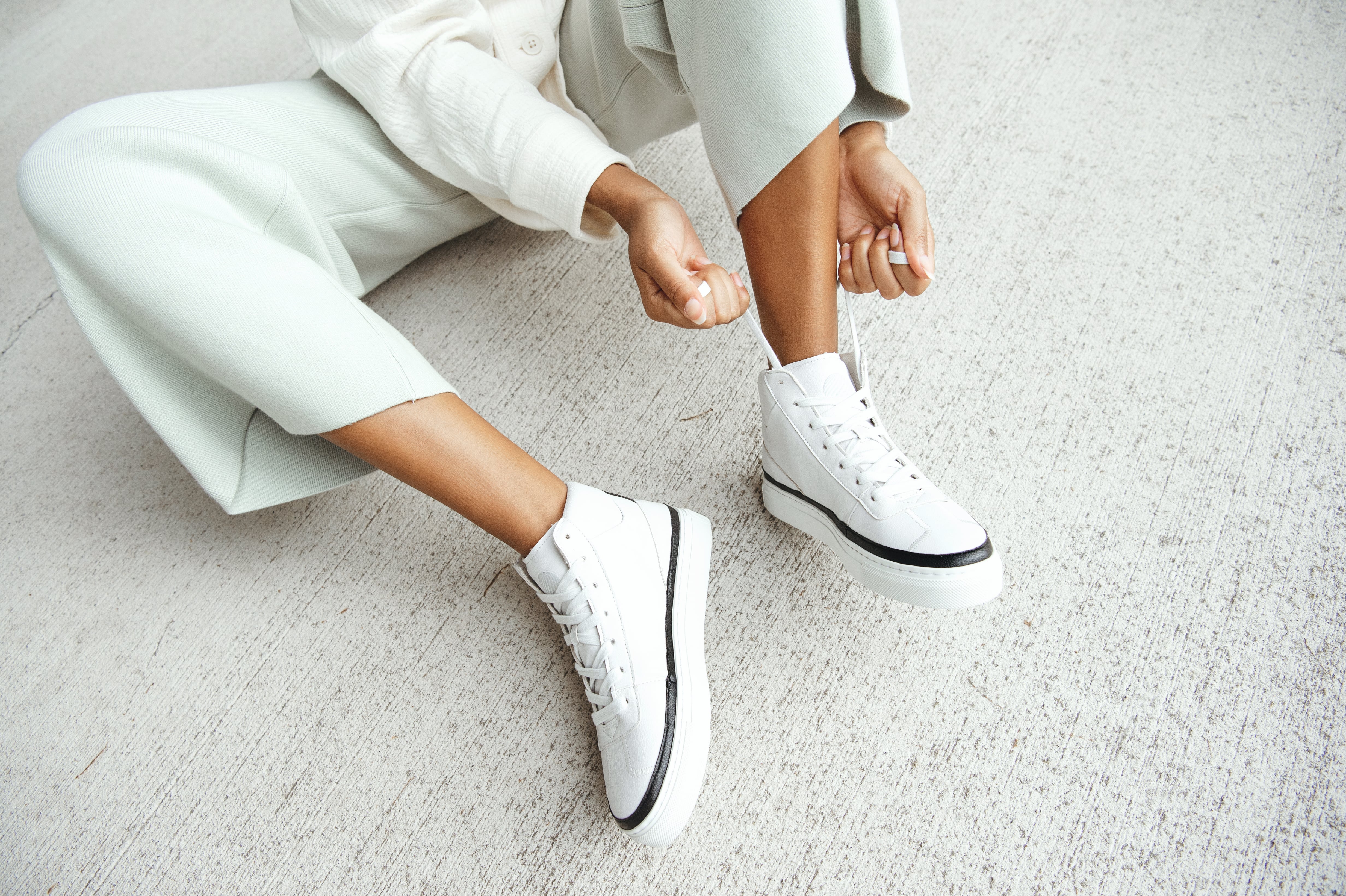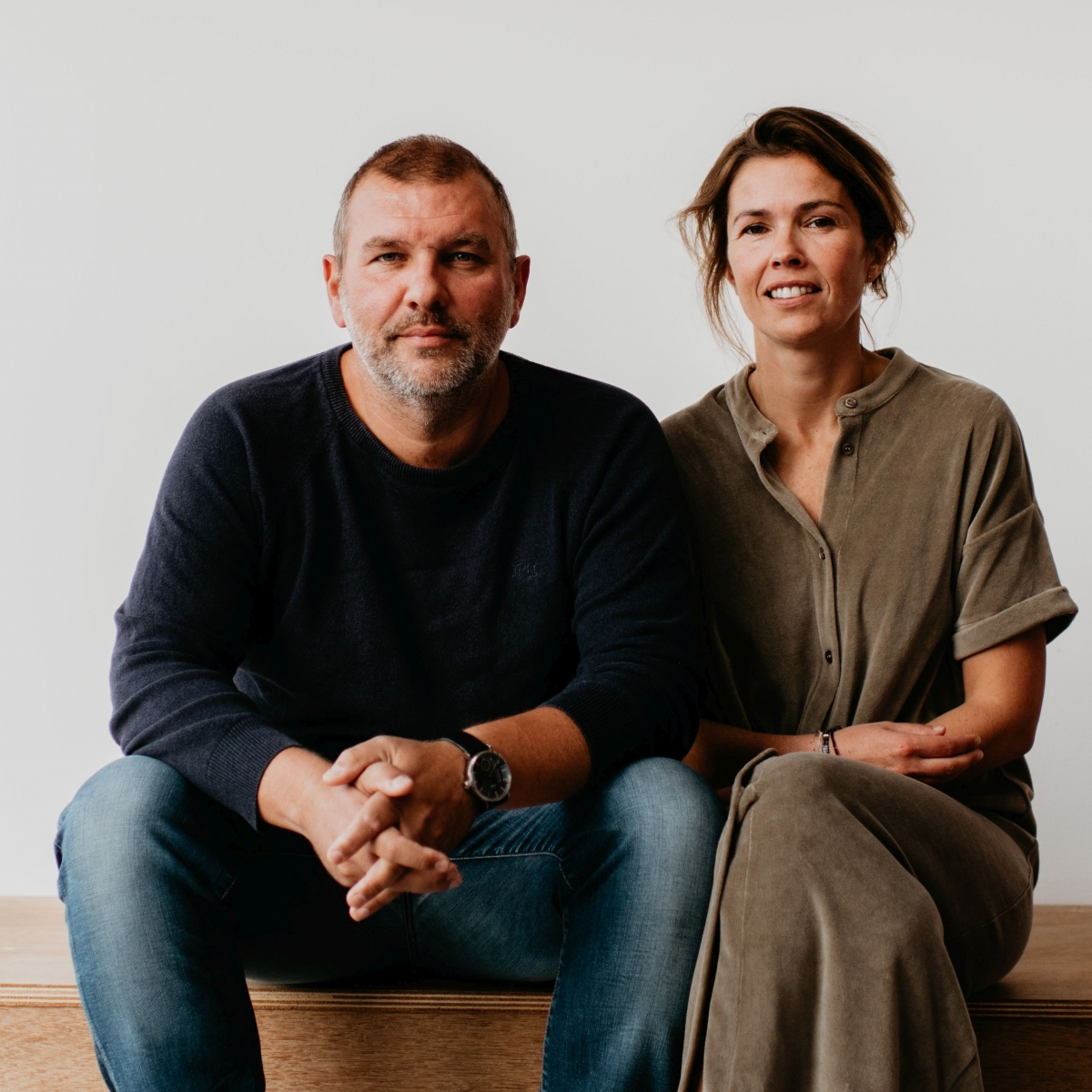Komrads
Who is… Komrads?
Since its foundation in 2015, Belgian sneaker brand Komrads has been putting its best foot forward to keep its carbon footprint to an absolute minimum (that’s a lot of ‘foot’ for one sentence, right?).
Sustainable materials are high on the label’s list of favourite things, because right from the get-go, Komrads founders and real-life partners Greet Goegebuer and Mark Vandevelde pledged to make a sneaker that is 100% recycled. That was a first for Belgium. At the moment, Komrads treats us to two collections, but they’re about to release their third sneaker line to the world.

![]()
Resources
Experimenting with 100% recycled materials
Komrads only works with recycled, certified materials. These include ‘usual suspects’ like recycled cotton and recycled rubber, but also more surprising options such as apple leather. Apple juice is not all ‘joy in a glass’; it also generates a lot of waste. Fortunately, discarded apple skins and cores can be turned into a sustainable alternative for leather that consists of at least 50% recycled apple fibres, 40% synthetic resin and 10% PU. Environmentally friendly, durable, high-quality: apple leather ticks all the boxes.
Together with the universities of Hasselt and Utrecht, Goegebuer and Vandevelde are considering their options to increase the percentage of apple fibres, without compromising on quality. The latest Komrads collection, in turn, puts plastic from the Mediterranean Sea and the Atlantic Ocean to good use – hence its name, OCNS. To turn this waste into wealth, the brand relies on fishermen (who collect the plastic debris) and on SEAQUAL (a company that makes fabric out of it).
![]()
Design
Fully recyclable sneakers
Komrads puts a lot of stock in optimization and innovation – not only when developing new materials, but also when it comes to design. Two years of testing and experimenting culminated in the ICNS and APLS collections, both created by an Antwerp-based designer.
Apple leather is the star of the APLS show, but the collection also contains recycled cotton and recycled polyurethane foam, which has activated carbon as its main component.
ICNS sneakers, with their recycled cotton shafts and their recycled rubber soles (either from car tires or the soles of other shoes), pay tribute to a design that has been around since the fifties, when the former USSR came up with their own Soviet sneaker in response to America’s Converse. The laces and lining of ICNS shoes are made from discarded pet bottles and recycled cotton. Even the glue is organic. In short: Komrads sneakers are not only made from recycled materials; they are also designed to be fully recyclable at the end of their lives.
![]()
Production
Portuguese production, powered by renewable energy
Komrads’ production takes place in Portugal, in decent working conditions and in return for fair wages. The brand’s Portuguese supplier recently obtained the AENOR certificate, an honour that is bestowed on companies that consistently deliver high-quality products without losing sight of their environmental impact. And that description does indeed suit the Komrads factory, which is completely powered by renewable energy. Goegebuer and Vandevelde also source their materials near their production site to reduce their carbon footprint.
![]()
Retail
FSC certified packaging
Komrads has agents in Belgium, the Netherlands, Germany, France, Israel, Finland, Norway and the US, but the brand also runs its own web shop, from which orders are shipped in FSC certified cardboard boxes.
![]()
Consumption
Shoes that last and that retain their appeal
The ICNS design, which has lost nothing of its appeal in the more than seventy years since it was first launched, proves that sneakers like Komrads’ can be worn for years on end. And that’s not only a matter of style, but of quality as well: Komrads shoes are durable. The brand wants customers to enjoy their sneakers for a long, long time.
![]()
End of life
Setting up a take-back and recycling system
Komrads hates the idea of shifting the responsibility for their products onto the people who buy them. That’s why the brand wants to give customers the opportunity to return their old sneakers, so they can be disassembled and recycled, and reused in the soles of new Komrads shoes.

What challenges are you currently facing?
Vandevelde and Goegebuer: “The challenges are huge. We have to try and maintain an acceptable retail price, despite high production costs (sustainable materials are simply more expensive). It’s not easy to balance both sides, but we want to convince customers that sustainability is the better choice and that it doesn’t necessarily have to be tough on the wallet. We’re in the middle of a growth spurt right now, so keeping sustainability top of mind in that respect as well is another challenge.”
This page was created in February 2021. Curious to find out where Komrads stands now? Feel free to get in touch with them via hello@komrads.world!
Mark Vandevelde and Greet Goegebuer (founders Komrads)
What does sustainability mean for you?
Mark Vandevelde and Greet Goegebuer: “Our children and their future on this planet are what inspired us to start producing sustainably – especially when we took a closer look at the fashion industry at the start of the Komrads story, and became even more aware of its polluting legacy, the often appalling working conditions (think of Rana Plaza, but also of the social dramas that are still unfolding today in Vietnam, Bangladesh and China). So, for us, sustainability is anything but a buzzword: it’s in our company’s DNA and it’s a part of our lives.
Yet we want to champion sustainability without compromising on quality, design or comfort. That’s why it was so important to us to release a premium sneaker that is not much more expensive than its non-sustainable counterparts. Our slogan sums it up nicely: ‘Let’s make a difference, feet first, cause this planet needs YOU to give a shit!"'
Which lesson(s) do you want to share?
Vandevelde and Goegebuer: “‘Done is better than perfect’. This means that you often just have to go for it. We never want to lose our agile start-up mentality, no matter how big we may become. We meet every setback with a positive attitude, because we know that there will be sunshine after the rain (and you can get a lot of rain as an entrepreneur).”